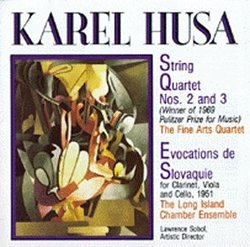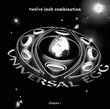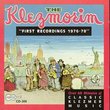| All Artists: Karel Husa, Lawrence Sobol, Fine Arts String Quartet, The Long Island Chamber Ensemble Title: String Quartets No.2 and No.3 Members Wishing: 0 Total Copies: 0 Label: Phoenix USA Original Release Date: 1/1/1990 Release Date: 1/1/1990 Genre: Classical Styles: Chamber Music, Historical Periods, Classical (c.1770-1830) Number of Discs: 1 SwapaCD Credits: 1 UPC: 094629301136 |
Search - Karel Husa, Lawrence Sobol, Fine Arts String Quartet :: String Quartets No.2 and No.3
 | Karel Husa, Lawrence Sobol, Fine Arts String Quartet String Quartets No.2 and No.3 Genre: Classical
Karel Husa (b. 1921 in Czechoslovakia) has taught at Comell since 1954; he composed Evocations in about 1952, the Second Quartet in 1953, and the Third in 1968. In the booklet, the composer writes charming and well-deserve... more » |
Larger Image |
CD DetailsSynopsis
Album Description Karel Husa (b. 1921 in Czechoslovakia) has taught at Comell since 1954; he composed Evocations in about 1952, the Second Quartet in 1953, and the Third in 1968. In the booklet, the composer writes charming and well-deserved tributes to these players for performances heard before the recordings were made. In turn, the Fine Arts Quartet was so impressed with, and had such success playing his Second Quartet, that they commissioned the Third, which then won a Pulitzer Prize in 1969. The Second Quartet is in three movements: Adagio-Allegro con Fuoco, Lento assai, Adagio-Allegro con brio. It has considerable rhythmic punch in the outer movements, which assume the fashionably astringent harmonies of its time: Stravinsky colored by Martinu, perhaps; but continued listening reveals no further depth of ideas nor development thereof. It is performed with an assurance born of experience, for the Fine Arts had been playing it for seven years prior to this recording. The Third Quartet has equal flash but more heart: an Allegro moderato builds to a moving coda; the Lento assai, too, has more to say than its earlier fellow; then comes a rather Bartokian scherzo, Allegro Possibile, a series of quiet but lively moments. This quartet is more soloistic than its predecessor; the first three movements feature the cello, viola, and violins respectively. All get together for the Adagio finale, which is the most expressive and satisfying music here. Evocations of Slovakia consists of three pieces: Mountain, Night, and Dance-for a lively, virtuoso clarinet with viola and cello accompaniment; they reach across the Danube to evoke Bartok as well, The Miraculous Mandarin in particular. Similar CDs
|
CD ReviewsAn essential aspect of Karel Husa's oeuvre, in authoritative Discophage | France | 02/13/2007 (5 out of 5 stars) "Thanks to Phoenix for bringing back on CD this landmark Everest recording of Karel Husa's 2nd and 3rd string quartets by the Fine Arts Quartet, to which they added "Evocations de Slovaquie", an early piece for clarinet, viola and cello, which originally came on a Grenadilla LP with Alan Hovhaness' "Firdausi" for clarinet, harp and percusion Op. 252. The information on the CD about recording dates is unfortunately non existent. The quartets were released in 1971 and Evocations in 1977, and the CD was published in 1990. The 2nd quartet was composed in 1953 at the behest of the French Parrenin Quartet, which later, in 1959, toured with it the United States. George Sopkin, the cellist of the Fine Arts Quartet, attended one of those concerts, liked the work, and the Fine Arts picked it up. That led to the commission given by the Fine Arts Quartet to Husa for another String Quartet, which was completed in 1968 and which, unknown from the composer, was presented by its dedicatees to the much coveted Pulitzer Prize - which it won, in 1969. The influence of Bartok can be heard in the earlier composition, but Husa is more advanced in his compositional language and fiercer in his expression, as well as starker in the brooding second movement and the slow intro to the third. In the highly virtuosic third quartet Husa uses a wide array of daring playing techniques exploited to coloristic effects: dramatic glissandos, eerie harmonics and strings playing in their extreme registers, col legno staccatos and so forth. In the first movement the viola features predominantly, with wild solos, in the second movement it is the cello and in the third both violins; In the fourth, all instruments come together. Evocations de Slovaquie was composed in 1951 and is instrumentally (clarinet, viola and cello) and stylistically situated somewhere between Bartok's Contrasts and Rhapsodies for violin. The Long Island Chamber Ensemble is comprised of Lawrence Sobold (clarinet), Louis Schulman (viola) and Timothy Eddy (cello). As for the quartets, they mirror in more than one way (one being, by an extraordinary coincidence, their same years of composition) those of another major contemporary composer from Central Europe: Gyorgy Ligeti, with the early one still indebted to Bartok though already highly personal, and the second breaking new grounds in contemporary string quartet language. As these, those of Husa belong to any collection of contemporary music. Good notes, including reminiscences by Husa on the circumstances of first performances and recordings. All the interpretations are authoritative, by the composer's own avowal. " Karel Husa is THE MAN! Dr. Fartmeister | Vancouver BC | 11/13/2001 (5 out of 5 stars) "If you are among the many people who have never heard Husa's music, I pity you. GET WITH IT! BUY THIS CD!
Here are Husa's three best known chamber works, the second (my personal favorite) and the Pulitzer Prize winning third String Quartets, and Evocations de Slovaquie, which is also quite a trip. His music is atonal, which some people do not particularly care for, but I tell you, even if you avoid atonality like the leprosy, you will still love Karel Husa. I have taken people that don't even like Mozart to Husa concerts, and they always leave with jaws dropped. The performances are definitely of great substance, too. The Fine Arts Quartet does justice to these rather challenging pieces, and the direction of the Long Island Chamber Ensemble definitely serves "Evocations" well too. In conclusion, all I can say is that if you don't buy this CD, I will be hurt. I will lock myself in the bathroom and cry for three and a half hours." |

 Track Listings (3) - Disc #1
Track Listings (3) - Disc #1
